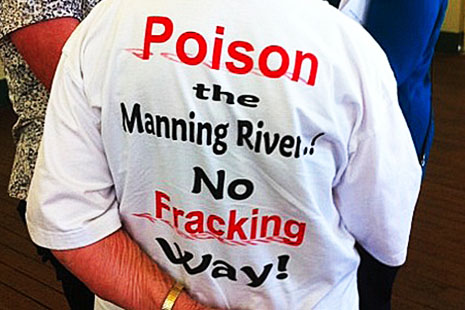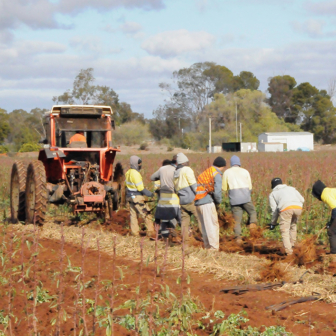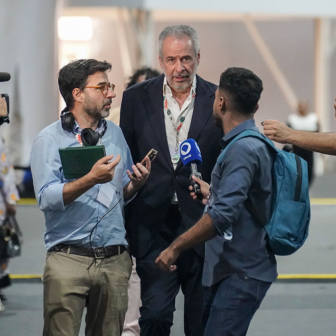ROB OAKESHOTT, one of the independent MPs who have kept Julia Gillard’s minority Labor government in power, is standing on the town hall stage in Wingham, a Manning River farming town on the mid-north coast of New South Wales. It is a Saturday morning in February, yet the town hall is packed with locals who have come to hear Oakeshott and others support their call for a stop to drilling for coal-seam gas, or CSG, an issue looming large in the forthcoming federal election.
Behind Oakeshott sits writer Di Morrissey, the patron of the Manning Alliance, a community action group. Peter Epov, its chair, and Drew Hutton, founder of Lock the Gate, an outfit dedicated to keeping CSG explorers off farms, are also on stage. Epov warms up the crowd by telling them that traditional politics, and parties, have failed them. “We have only three representatives left, and they’re all in this room,” he says. “The first is Rob Oakeshott, the second is Drew Hutton and the third is you, the people, who can stand up and say, ‘We have had enough!’” The audience, responding to his call for a fresh wave of frontier people power, roars its approval.
Wingham offers a snapshot of the changing face of rural politics across eastern Australia. I’ve driven from Sydney to the cattle and former timber town where I spent my childhood to see how the rise of community groups like the Manning Alliance is bringing this about. Wingham Town Hall, a handsome 1920s building, was where I attended the innocent movie matinees of my childhood, when it doubled as the town’s second cinema. At first sight, little seems to have changed in fifty years. A piano on the side of the stage looks as if it has not moved since the days when my parents and their friends attended sedate country balls here. What’s new are the political banners stretching the length of the hall. “Dignity and Respect,” they declare. “No CSG – Keep Our Water Clean in Our Valley.” “Our Land – Our Future.” The women serving tea and scones wear T-shirts saying, “Poison the Manning River? No Fracking Way!”
Wingham lies in the conservative rural heartland of Oakeshott’s federal electorate of Lyne, which stretches from coastal towns like Port Macquarie to the New England and Hunter regions. Before he won the seat five years ago, all of Lyne’s previous MPs had been from the Country or National parties. The humdrum constancy of local affairs once allowed the Nationals to own the Manning; now, the joining together of two old enemies, greenies and farmers, to stop CSG has spun politics into uncharted territory. Oakeshott’s support for the Gillard government has made him unpopular among the region’s diehard conservative voters, but the town hall audience treats him like a rock star. If any Nationals representatives are here today, they’re keeping their heads down.
The Manning Alliance was formed two years ago, after locals discovered that the NSW government had issued CSG exploration licences in the region. At Gloucester, a farming town about sixty kilometres southwest, the energy company AGL plans to drill 110 CSG wells and pipe the gas to Newcastle. With exploration by what has been a largely unregulated industry spreading from suburban Sydney through the Hunter Valley to New England, Manning valley farmers and townsfolk fear they are next. The Gloucester River runs into the Manning. What alarms them most is the potential impact on the rivers of hydraulic fracturing, or fracking, the method of pumping water, sand and chemicals to extract gas from coal seams. Politicians on both sides, mesmerised by royalty revenues in a gas-poor state, have been silent on this.
Peter Epov, the alliance’s chairman, is a former sports administrator and business consultant. He moved to the valley eight years ago after falling in love with its “pristine” environment and “beautiful” river. He discovered that Di Morrissey, a broadcasting colleague at the 1984 Los Angeles Olympics, had settled there for similar reasons. Three years ago, Epov and his family learned with shock that their property outside Wingham was included in a new CSG exploration zone.
The alliance cut its teeth on another environmental issue last year when it took on TransGrid. The state-owned power company had planned to build a network of giant electricity pylons across about one hundred kilometres of the Manning valley. Bruce Robertson, a former Sydney economist now living at Burrell Creek outside Wingham, crunched numbers, publicly blowing a hole in a vital part of TransGrid’s case – its claim that electricity demand would soar by a quarter over a decade. Grid Australia, the body representing transmission companies including TransGrid, threatened to sue him last November, then apologised. TransGrid has scaled down and delayed its project. In response to a complaint from the Manning Alliance, the Australian Energy Regulator criticised TransGrid in late February for providing insufficient information on why its proposed mega-line was needed.
As the alliance’s deputy chair, Robertson has turned his attention to CSG. He predicts at least 5000 wells will be drilled between the Manning valley and the Queensland border in ten years if governments keep handing out licences at the same rate.
In Epov and Drew Hutton, the Wingham rally has articulate speakers with finely tuned presentation skills that leave most politicians for dead. Hutton’s perspective is Queensland, where CSG has moved beyond mere exploration to production on an industrial scale. He calls CSG “the biggest threat to the Australian landscape since the expansion of the pastoral frontier.” Epov says mining once created jobs for Australians. “Now it’s creating chaos for local communities.”
This is the key puzzle for politicians. Unlike most mining booms, this one involves ground where millions of voters live, and governments seem to be feeling their sting. The Gillard government is tapping into public anger over CSG as a federal election issue. In late January, the prime minister wrote to Rob Oakeshott inviting the Manning Alliance to meet with her climate change and environment adviser. A fortnight after the Wingham town hall meeting, Barry O’Farrell, the NSW Liberal premier, finally blinked: he announced a two-kilometre exclusion zone for CSG exploration around towns and suburbs (but not farms). Even so, it seems likely that governments’ fights with groups such as the Manning Alliance have only just begun. •




